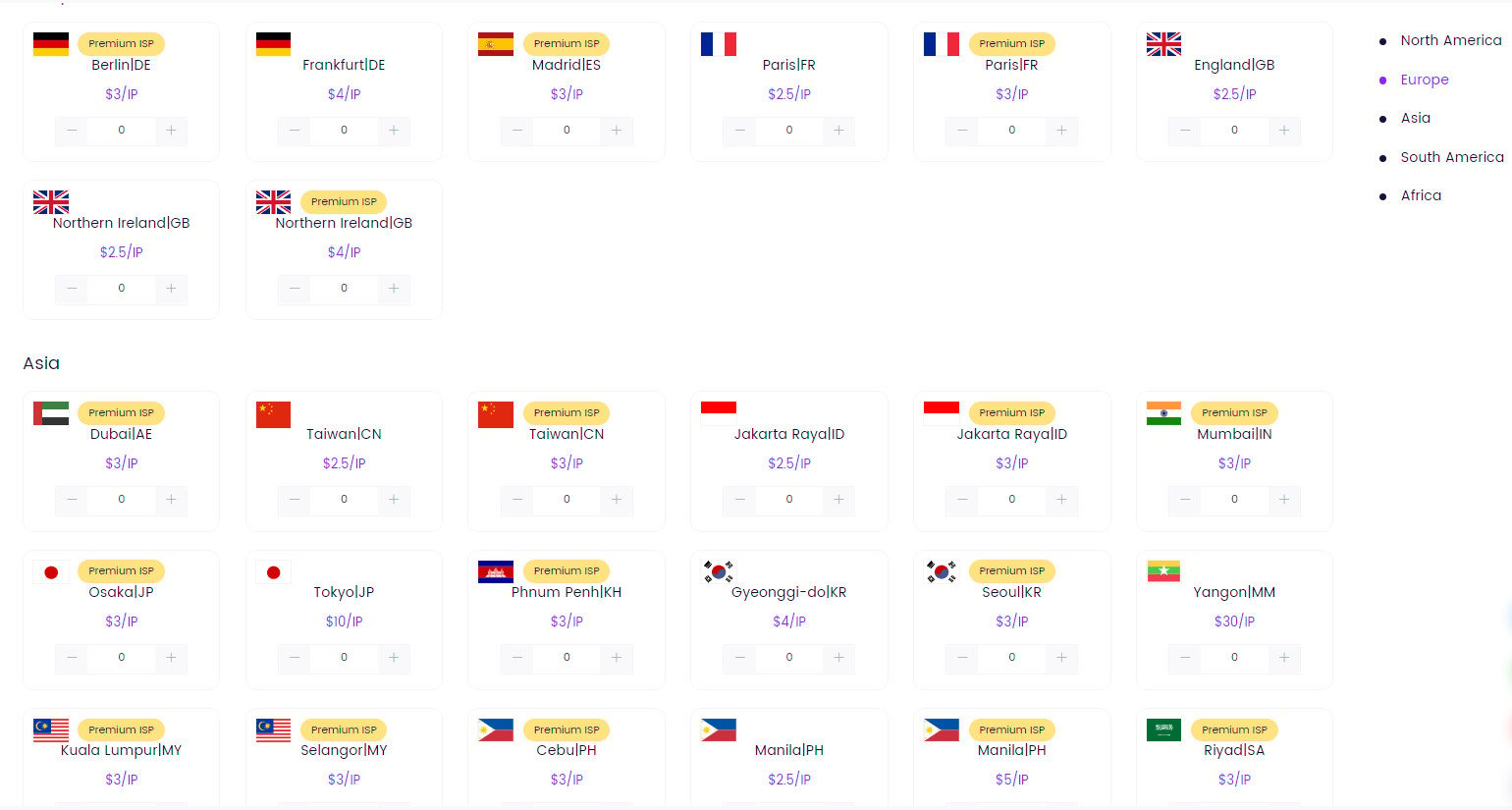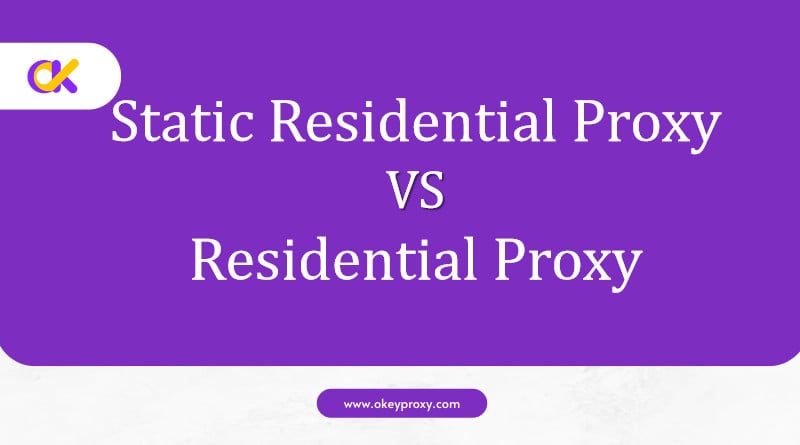Im Bereich des Online-Datenschutzes und des Web-Scraping spielen Proxys eine entscheidende Rolle bei der Maskierung von IP-Adressen und der Umgehung von Geobeschränkungen. Es gibt verschiedene Arten von Proxys, Statische Anwohnervertretungen und Wohnsitzvollmachten werden häufig diskutiert. Das Verständnis ihrer Unterschiede, Anwendungen und Vorteile kann Nutzern helfen, fundierte Entscheidungen auf der Grundlage ihrer spezifischen Bedürfnisse zu treffen. Dieser Leitfaden befasst sich mit den Feinheiten von statischen Proxys für Privatanwender und Proxys für Privatanwender, hebt die wichtigsten Funktionen und Anwendungsfälle hervor und empfiehlt eine umfassende Lösung für eine optimale Proxy-Erfahrung.
Einführung in Proxies
Was bedeutet ein Proxy? Ein Proxy-Server fungiert als Vermittler zwischen dem Gerät eines Nutzers und dem Internet. Er leitet Anfragen des Nutzers an den Zielserver weiter, maskiert die IP-Adresse des Nutzers und stellt eine neue bereit.
Proxies können je nach Herkunft und Funktionsweise in verschiedene Typen eingeteilt werden. In diesem Artikel konzentrieren wir uns auf:
- Vollmachten für Wohnzwecke: Diese verwenden IP-Adressen, die von Internetdienstanbietern (ISPs) zugewiesen werden und mit realen Wohnorten verbunden sind.
- Statische Wohnsitz-Proxys: Eine Unterart der Residential Proxies mit festen IP-Adressen, die sich im Laufe der Zeit nicht ändern.
Vertretungen für Wohnzwecke: Ein Überblick
Was ist eine Wohnsitzvollmacht?
Wohnsitzvollmachten verwenden IP-Adressen, die von Internet-Diensteanbietern an Privathaushalte vergeben werden. Sie bieten ein hohes Maß an Anonymität, da sie als normale Haushalts-IPs erscheinen.
Merkmale von Proxies für Wohnzwecke
- Authentische IP-Adressen: Diese IPs sind mit tatsächlichen Wohnadressen verknüpft, so dass die Wahrscheinlichkeit, dass sie von Websites erkannt werden, geringer ist.
- Dynamische Natur: Je nach den Richtlinien des Proxy-Anbieters werden die IPs häufig rotiert oder regelmäßig geändert.
- Geografische Diversität: Wohnsitz-Proxys können in verschiedenen geografischen Regionen angesiedelt werden und ermöglichen so einen lokalisierten Zugang.
Vor- und Nachteile von Wohnsitzvollmachten
| Profis | Nachteile |
|---|---|
| Hohe Anonymität: Von Websites nur schwer zu erkennen | Higher Cost: More expensive than Rechenzentrums-Proxys |
| Geografische Flexibilität: Zugang zu verschiedenen Regionen | Variabilität der Geschwindigkeit: Im Vergleich zu Proxies in Rechenzentren kann es zu langsameren Geschwindigkeiten kommen. |
| Bessere Erfolgsquote: Weniger Sperren und Verbote | Begrenzte Verfügbarkeit: Weniger IPs verfügbar als bei Proxies in Rechenzentren |
Statische Proxies für Wohngebiete: Ein detaillierter Blick
Was ist eine statische Wohnsitzvollmacht?
Statische Wohnsitzvollmachten sind eine Art Residential Proxy, der eine feste IP-Adresse bereitstellt. Im Gegensatz zu dynamischen Proxys, die sich häufig ändern können, behalten statische Proxys die gleiche IP-Adresse über einen längeren Zeitraum.
Merkmale der statischen Wohnproxies
- Feste IP-Adresse: Bleibt konstant und sorgt für stabile Verbindungen und konsistenten Zugang.
- Erhöhte Verlässlichkeit: Ideal für Aufgaben, die eine stabile IP erfordern, z. B. langfristiges Web-Scraping oder Zugriff auf eingeschränkte Inhalte.
- Wohn-IPs: Wie reguläre Proxys für Privatanwender werden diese IPs von Internetanbietern an echte Nutzer vergeben.
Vor- und Nachteile von statischen Proxies für Wohngebiete
| Profis | Nachteile |
|---|---|
| Stabile Verbindung: Feste IP-Adresse sorgt für Konsistenz | Höhere Kosten: In der Regel teurer aufgrund der festen Natur |
| Ideal für längerfristige Projekte: Geeignet für Aufgaben, die einen dauerhaften Zugang erfordern | Risiko der Entdeckung: Statische IPs können bei übermäßiger Nutzung möglicherweise erkannt werden |
| Verbesserte Leistung: Gleichbleibende Geschwindigkeiten und weniger Unterbrechungen | Limited Rotation: Less flexible compared to rotierende Wohnsitzvollmachten |
Unterschiede zwischen statischen Proxies für Wohnzwecke und Proxies für Wohnzwecke
Es gibt Tabellen mit den wichtigsten Unterschieden zwischen statischen Proxys und Proxys für Wohnzwecke, die dabei helfen, zu bestimmen, welche Art von Proxy für verschiedene Aufgaben auf der Grundlage spezifischer Bedürfnisse besser geeignet ist.
-
Leistung
Merkmal Statischer Wohnsitz-Proxy Wohnsitzvollmacht IP-Stabilität Behoben, ändert sich nicht Dynamisch, ändert sich periodisch Geschwindigkeit Hoch, beständig Variabel, kann sich während der Nutzung ändern Verwaltung Einfacher, keine häufigen Aktualisierungen erforderlich Erfordert die Bearbeitung von IP-Änderungen Datenschutz Hoch, da stabil und wohnortnah Hoch, aber weniger vorhersehbar Kosten Höher aufgrund fester IP Niedriger, variiert jedoch je nach Anbieter Anonymität Hoch, mit dem zusätzlichen Vorteil einer festen IP Hoch, aufgrund von echten Wohn-IPs Flexibilität Begrenzt Hoch, mit automatischer IP-Rotation Sicherheit Geeignet für sichere Transaktionen Besser für anonymes Surfen Risiko Niedriger, es sei denn, die IP wird übermäßig genutzt oder ist gekennzeichnet Höher, wenn IP häufig wechselt -
Eignung des Anwendungsfalls
Anwendungsfall Statischer Wohnsitz-Proxy Wohnsitzvollmacht Langfristige Projekte Ideal für Projekte, die eine stabile IP benötigen Weniger geeignet wegen der Dynamik Geografisch eingeschränkte Inhalte Wirksam für dauerhaften Zugang Wirksam, aber mit weniger Konsequenz Web-Scraping Hervorragend geeignet für Schürfarbeiten, die ständigen Zugang erfordern Geeignet, aber IP kann sich ändern und sich auf Scraping-Aufgaben auswirken SEO-Tauglichkeit Ideal für die Überwachung von Rankings im Zeitverlauf Effektiv für kurzfristiges Scraping und Datenerfassung Kontoführung Großartig für die konsistente Verwaltung mehrerer Konten Nützlich, kann aber bei IP-Änderungen Probleme verursachen Marktforschung Effektiv für eine einheitliche und lokalisierte Datenerfassung Ideal für die Erfassung verschiedener Daten über mehrere Standorte hinweg durch rotierende IPs
Statische Proxies für Privatanwender bieten eine konsistente, feste IP-Adresse von einem privaten Internetanbieter. Sie sind ideal für Aufgaben, die eine langfristige Stabilität erfordern, z. B. die Verwaltung von Konten oder den Zugriff auf geografisch eingeschränkte Inhalte. Sie bieten ein hohes Maß an Anonymität, bergen aber ein höheres Risiko, auf eine schwarze Liste gesetzt zu werden, und sind in der Regel teurer.
Im Gegensatz dazu rotieren Proxies für Privatanwender die IP-Adressen aus einem Pool echter Privatanwender-IPs, wodurch sie sich besser für Aktivitäten wie Web-Scraping und Anzeigenüberprüfung eignen, bei denen häufige IP-Wechsel helfen, eine Entdeckung zu vermeiden. Sie bieten größere Flexibilität, niedrigere Kosten und ein geringeres Risiko, auf eine schwarze Liste gesetzt zu werden, da die IPs rotieren.
Tipps für die statische Vorsorgevollmacht und die Wohnsitzvollmacht
Wählen Sie den richtigen Bevollmächtigten für Ihre Bedürfnisse
Wählen Sie die Art des Proxys entsprechend Ihren Anforderungen. Für langfristige Projekte oder Aufgaben, die einen konstanten Zugriff erfordern, sind statische Proxys für Wohngebiete vorzuziehen. Für dynamischere Anforderungen, wie z. B. IP-RotationWohnsitzvollmachten bieten Flexibilität.
Proxy-Nutzung überwachen
Überwachen Sie regelmäßig die Leistung und den Status Ihrer Proxys. Vergewissern Sie sich, dass sie nicht auf einer schwarzen Liste stehen oder gekennzeichnet sind, und passen Sie Ihre Proxy-Strategie bei Bedarf an.
Verwenden Sie zuverlässige Anbieter
Entscheiden Sie sich für seriöse Proxy-Anbieter, um einen hochwertigen Service und eine zuverlässige Leistung zu gewährleisten. OkeyProxy bietet sowohl statische als auch dynamische Proxys für Wohngebiete mit außergewöhnlicher Unterstützung und Leistung.
Eine intelligente Lösung: Statischer Proxy & Wohnsitz-Proxy - OkeyProxy
OkeyProxy bietet eine Reihe von Proxy-Lösungen, darunter sowohl statische als auch dynamische Proxys für Privatanwender, um verschiedene Anforderungen zu erfüllen. Die Proxys bieten hohe Leistung, Zuverlässigkeit und eine umfassende geografische Abdeckung.
Vorteile von OkeyProxy
- Zuverlässige Leistung: Die Proxys von OkeyProxy sind für ihre Stabilität und Leistung bekannt.
- Große Auswahl: Zugriff auf einen großen Pool von IP-Adressen für verschiedene Anwendungsfälle.
- Außergewöhnliche Unterstützung: OkeyProxy bietet robuste Kundenbetreuung um bei Problemen oder Fragen zu helfen.
- Konkurrenzfähige Preisgestaltung: Bietet qualitativ hochwertige Proxys zu wettbewerbsfähigen Preisen.

Wie man mit OkeyProxy anfängt

- Registrieren Sie sich: Erstellen Sie ein Konto auf der OkeyProxy Website.
- Wählen Sie Ihren Plan: Wählen Sie einen Proxy-Plan, der Ihren Bedürfnissen entspricht, egal ob es sich um statische oder dynamische Proxys handelt.
- Konfigurieren und verwenden: Befolgen Sie die Einrichtungsanweisungen, um Ihre Proxys zu konfigurieren und zu verwenden.
HOLEN SIE SICH JETZT EINE KOSTENLOSE TESTVERSION VON OKEYPROXY!
Schlussfolgerung
Die Wahl zwischen statischen Proxys und Proxys für Privatanwender hängt von Ihren spezifischen Bedürfnissen und Anwendungsfällen ab. Statische Proxys bieten Stabilität und Konsistenz und sind daher ideal für langfristige Projekte und dauerhaften Zugang. Wohnsitz-Proxys hingegen bieten Flexibilität und sind für dynamische Umgebungen geeignet. OkeyProxy zeichnet sich als zuverlässiger Anbieter aus, der beide Arten von Proxys mit hervorragender Leistung und Unterstützung anbietet. Ob feste IP-Stabilität oder dynamische IP-Flexibilität gefragt ist, OkeyProxy können Ihre Anforderungen effektiv erfüllen.

